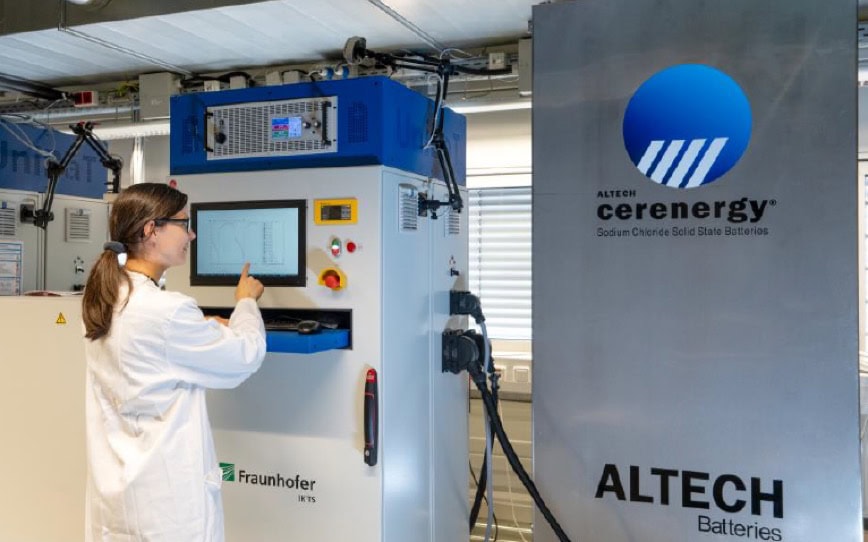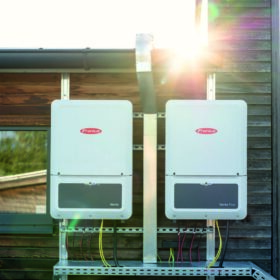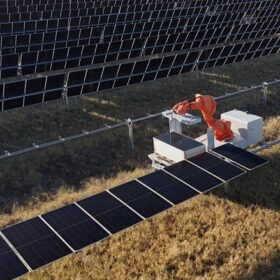Perth-based Altech said a prototype 60 kWh sodium chloride solid state battery energy storage system installed at joint venture partner Fraunhofer IKTS’ test laboratory in Germany has passed all physical tests with “flying colours.”
The ABS60 battery pack is composed of 240 Cerenergy cells, each rated at 2.58 V. Each cell is constructed with ceramic solid-state technology that relies on sodium ions found in common table salt. These cells are organised in four rows, each comprising 12 cells, and stacked five modules high to providing a total capacity of 60 kWh. The battery pack is housed in a IP65-rated unit that measures 2.6 m in height, 0.4 m in length, and 1 m in width.
The prototype has been integrated into a specially designed battery test station at Fraunhofer’s base, enabling continuous daily charging and discharging cycles to assess the battery’s efficiency, stability, and overall performance under real-world conditions.
Altech said the battery unit has “passed all physical tests with flying colours, exhibiting exceptional efficiency and robust performance whilst maintaining safe, optimal operating temperatures.”
“Initial results from the testing are extremely promising,” the company said in a statement, adding that the battery has “outperformed early expectations, exhibiting exceptional efficiency and robust performance across all key metrics.”
“Notably, the battery has maintained excellent thermal stability, a crucial factor in high-capacity energy storage systems.”
Altech said key results from more than 500 cycles demonstrated stable performance, including a consistent discharge capacity of 80 Ah and an efficiency of up to 91%. The company said discharge and overcharge stress and abuse tests were conducted on almost 500 individual cells, including at operational temperature of up to 300degC, without any cell failures.
Altech Chief Executive Officer and Managing Director Iggy Tan said the findings demonstrate the cells’ potential for long-term stability, high energy capacity, and reliability in high-temperature applications.
“We are extremely pleased that the first Cerenergy 60 kWh battery prototype is now up and running and operating better than expected,” Tan said.
“The prototype can now be demonstrated under real-world conditions, providing critical data for offtake parties.”
Tan said the test results will be invaluable as Altech advances the development and commercialisation of the technology and pushes forward with finance to construct a planned 120 MWh manufacturing facility.
Altech recently signed a letter of intent to supply 30 of its 1 MWh GridPack battery packs annually to be used at a German industrial estate for energy storage as part of a five-year deal commencing in mid-2027. The agreement has been struck with consultancy firm Zweckverband Industriepark Schwarze Pumpe which oversees the industrial estate in southeast Germany.
The deal represents Altech’s first offtake deal for its batteries which it said avoid using metals such as lithium, cobalt, graphite and copper, providing a cost reduction of up to 40% compared to lithium-ion batteries.
Altech said its batteries are completely fire and explosion proof, have a life span of more than 15 years and operate in all but the most extreme conditions.
“They are also a cost-effective solution for storing and distributing renewable energy across a variety of applications, including grid-scale storage, microgrids, and electric vehicle charging,” the company said.
This content is protected by copyright and may not be reused. If you want to cooperate with us and would like to reuse some of our content, please contact: editors@pv-magazine.com.









1 comment
By submitting this form you agree to pv magazine using your data for the purposes of publishing your comment.
Your personal data will only be disclosed or otherwise transmitted to third parties for the purposes of spam filtering or if this is necessary for technical maintenance of the website. Any other transfer to third parties will not take place unless this is justified on the basis of applicable data protection regulations or if pv magazine is legally obliged to do so.
You may revoke this consent at any time with effect for the future, in which case your personal data will be deleted immediately. Otherwise, your data will be deleted if pv magazine has processed your request or the purpose of data storage is fulfilled.
Further information on data privacy can be found in our Data Protection Policy.